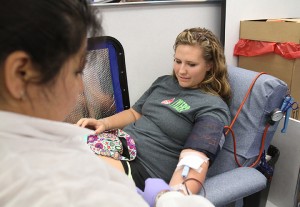
Matt Hellman | Lariat Photo Editor
By Maegan Rocio
Staff Writer
Donated blood in the Central Texas area has tested positive for the West Nile Virus since the recent outbreak this past summer.
According to the Centers for Disease Control and Prevention, humans can contract West Nile through mosquito bites. It is most often spread to humans when a mosquito feeds on an infected bird, then bites a human. CDC statistics show approximately 80 percent, or four out of five people, infected with the virus will not show any symptoms at all.
According to the CDC, West Nile Virus is a seasonal epidemic that suddenly occurs in the summer and continues into the fall. Their website states, the serious symptoms can last for several weeks and effect a person’s neurological system. The serious symptoms include fever, headache, neck stiffness, stupor, disorientation, tremors, convulsions, muscle weakness, vision loss, numbness, paralysis, and coma.
Symptoms can develop between three to 14 days after being bitten by an infected mosquito.
There have been 34 confirmed cases of West Nile in McLennan County so far this year.
Linda Goelzer, director of public relations at Carter BloodCare in Waco, a blood donation agency, said 71 infected donations have been found among the collection from July 12 to Sept. 12. She said Carter BloodCare did not find any infected donations in 2010 or 2011.
“This year has been difficult. So naturally, we would find positive donors,” she said.
Goelzer said while she does not know if she can link this year’s number of positive cases of West Nile Virus to the recent outbreak, she said Carter BloodCare can anticipate positive asymptomatic cases among their donors.
Dr. Walter Linz, medical director of Scott and White Blood Center in Temple, said the blood center has also found infected units among donated blood.
“We have had a few positive cases, around three to four,” he said. “The last one was back in early August.”
All blood donation centers across the nation are required by law to screen every unit of blood before and after the collecting process.
Goelzer said Carter BloodCare workers screen every donor before they donate blood.
“The process is regulated by the FDA,” she said. “Part of the screening includes a questionnaire and also a mini-physical where workers take their temperature, their blood pressure, their pulse. We ask about their health, and we do a little finger prick, like if you are doing a cholesterol screening.”
Goelzer said Carter BloodCare tests for hemoglobin before the donation process. Hemoglobin is an indicator of the level of iron in a person’s blood. If enough hemoglobin isn’t present in a potential donor’s blood, they cannot donate. That standard is set by the FDA.
After donations, the centers send their supplies to testing labs to test them for the virus.
Linz said the test involves searching for and detecting any RNA from the virus.
“It is a molecular test that is looking for the viral DNA,” he said. “It picks up the virus so early that, for example, if someone gave blood, and the next morning I get a report of an infection, I talk to them as soon as I get the report. The test is picking people when they are asymptomatic. It’s a wonderful test.”
Dr. Lesley Kresie, the medical director of laboratory services for Carter BloodCare, said the test for West Nile virus is so sensitive that it picks up other things such as hepatitis A and B.
Goelzer said Carter BloodCare is responsible for alerting any donors of viral DNA in their blood and giving a report to the Texas Department of State Health Services.
“Anyone who knows of a positive case is required to report it,” she said.
Goelzer said the numbers of cases the state reports are those that show symptoms for the virus. She said the blood testing facilities only record and report positive, asymptomatic cases.
Infected donors are surprised to learn they have the virus from blood donation agencies because for many, the virus is asymptomatic, Goelzer said.
“They don’t feel sick,” she said.
Goelzer said after state blood collection agencies learn a donor is infected with the virus, they inform the person and give them a deferral period in which they cannot donate.
“When the lab conducts the test, we let them know if they are positive for West Nile,” she said. “They can’t donor blood for 120 days, which is a fairly short deferral. Even though they feel well, they still have the virus in their blood.”
Linz said the 120-day deferral period is enforced to allow the donor’s body to recover from the virus.
Goelzer said that Carter BloodCare is not worried about the virus appearing in its donation supplies. “When we begin to see reports form the health department indicating that West Nile Virus will be active this year, we can often anticipate that there will be a number of positive tests among donors,” she said.
Despite the positive cases of West Nile Virus appearing in donation supplies, both centers still want people to come and donate blood.
“You’re saving three lives with every pint of blood you give,” Goelzer said. “We’re able to divide the different components for different needs. For example, we use platelets for blood cancer patients that are undergoing blood chemotherapy.”
Linz said blood donation are needed to sustain “the blood community.”
“We need blood donations from people who are healthy and qualified,” he said. “As a blood community, we would like people to come in a few times a year to donate blood. We always want the constant donor to have a healthy blood supply. We encourage them to donate a few times a year to give blood.”
Carter BloodCare has partnered with Alpha Phi Omega for its semi-annual blood drive on campus.



